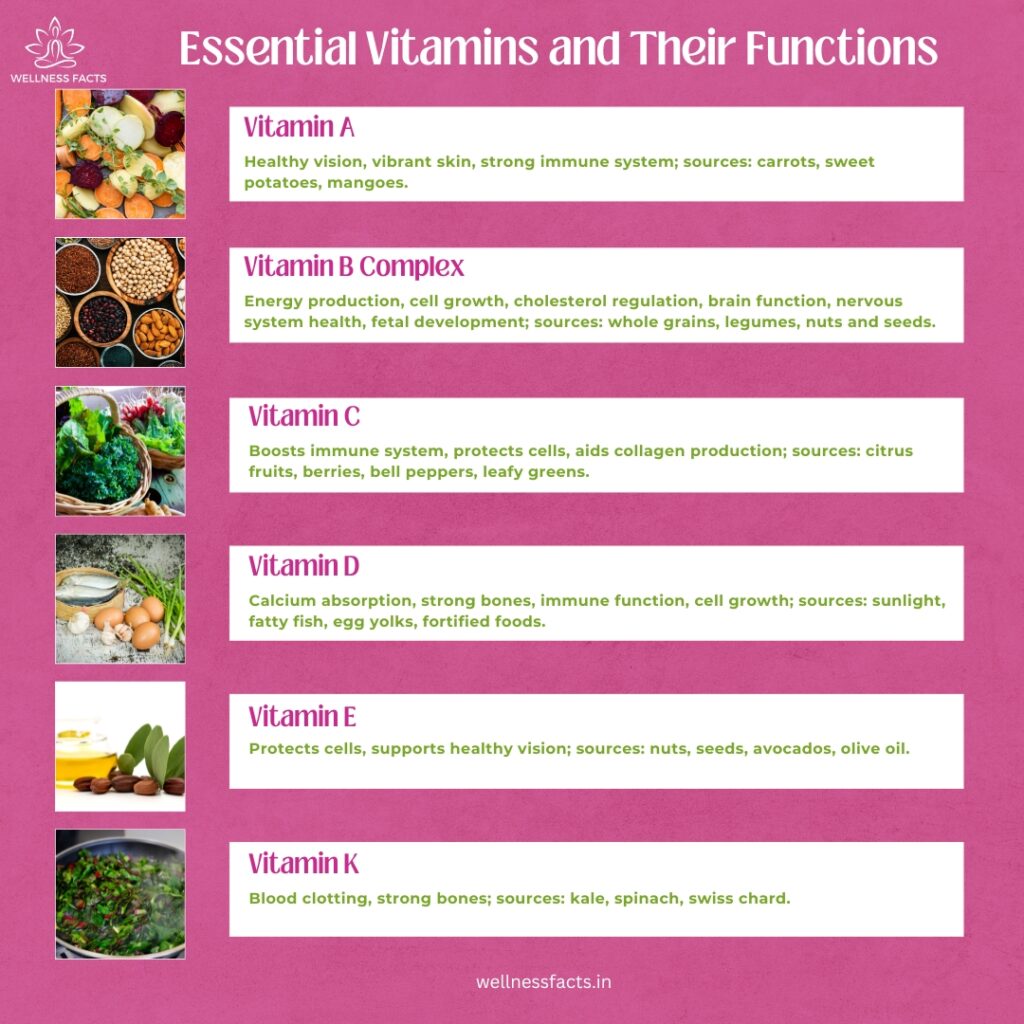We all know the importance of a balanced diet. We strive for a rainbow of fruits and vegetables, lean protein sources, and whole grains. But what about the hidden players on our plates, the essential nutrients that work tirelessly behind the scenes? Vitamins and minerals are the unsung heroes of a healthy diet, and micronutrients vital for our body’s proper function.
While they don’t provide us with direct energy like carbohydrates, fats, and proteins (macronutrients), vitamins and minerals are the conductors of the orchestra, ensuring all the processes in our body run smoothly. From keeping our bones strong to boosting our immune system, these micronutrients play a crucial role in maintaining overall health and well-being.
Unveiling the Powerhouse: Vitamins and Their Functions

There are 13 essential vitamins, each with its unique set of responsibilities. Let’s explore some of the key vitamins and their functions:
- Vitamin A: Think healthy vision, vibrant skin, and a strong immune system. Vitamin A plays a vital role in all three. It’s found in orange and yellow fruits and vegetables like carrots, sweet potatoes, and mangoes.
- Vitamin B Complex: This group of B vitamins is like a well-oiled machine, working together for various functions. Vitamin B1 (thiamine) supports energy production, B2 (riboflavin) aids in cell growth and repair, B3 (niacin) helps regulate cholesterol, B6 (pyridoxine) is essential for brain function, B12 (cobalamin) keeps our nervous system healthy, and folic acid is crucial for cell division and fetal development. B vitamins are abundant in whole grains, legumes, nuts, seeds, and lean meats.
- Vitamin C: This antioxidant powerhouse is famous for boosting the immune system and protecting cells from damage. It’s also necessary for collagen production, which keeps our skin, bones, and tissues healthy. Citrus fruits, berries, bell peppers, and leafy greens are all rich sources of vitamin C.
- Vitamin D: Often referred to as the “sunshine vitamin,” vitamin D is essential for calcium absorption and maintaining strong bones. Additionally, it contributes to immune function and cell growth. While our bodies can synthesize vitamin D from sunlight exposure, dietary sources include fatty fish, egg yolks, and fortified foods like milk and cereals.
- Vitamin E: Another antioxidant warrior, vitamin E protects cells from damage and supports healthy vision. Nuts, seeds, avocados, and olive oil are good sources of vitamin E.
- Vitamin K: Essential for blood clotting and maintaining strong bones. Leafy greens like kale, spinach, and swiss chard are abundant in vitamin K.
The Mighty Minerals: Building Blocks of a Healthy Body
Minerals are inorganic elements needed by the body in varying amounts. Just like vitamins, each mineral has a specific function:
- Calcium: The building block of strong bones and teeth, calcium is also essential for muscle function and nerve transmission. Dairy products, leafy greens, and fortified foods like tofu are rich in calcium.
- Iron: This mineral is crucial for carrying oxygen throughout the body, preventing fatigue and anemia. Red meat, poultry, fish, beans, lentils, and iron-fortified cereals are good sources of iron.
- Potassium: A crucial mineral for regulating blood pressure and supporting muscle function. Fruits, vegetables, and legumes are all good sources of potassium.
- Magnesium: Supporting muscle and nerve function, regulating blood sugar levels, and promoting healthy bone formation are just some of the many benefits of magnesium. Nuts, seeds, whole grains, and leafy greens are rich in magnesium.
- Sodium: While often demonized, sodium plays a role in maintaining fluid balance and nerve transmission. However, moderation is key, and most of our sodium intake comes from processed foods. Aim to focus on natural sources like sea salt and celery.
Fueling Your Body with a Vitamin and Mineral Rich Diet
So, how can you ensure you’re getting enough vitamins and minerals? Here are some tips:
- Embrace Variety: A balanced diet is key. Include a rainbow of fruits and vegetables, whole grains, lean proteins, and healthy fats in your meals.
- Focus on Whole Foods: Whole, unprocessed foods are generally richer in vitamins and minerals than their refined counterparts.
- Read Food Labels: Pay attention to the vitamin and mineral content of packaged foods. Choose options fortified with essential nutrients.
- Consider a Multivitamin (Consult Doctor): If you find it challenging to meet your daily needs through diet alone, a multivitamin can be a helpful supplement. However, it’s important to talk to your doctor before starting any supplements.
Remember, a balanced diet is the best way!
